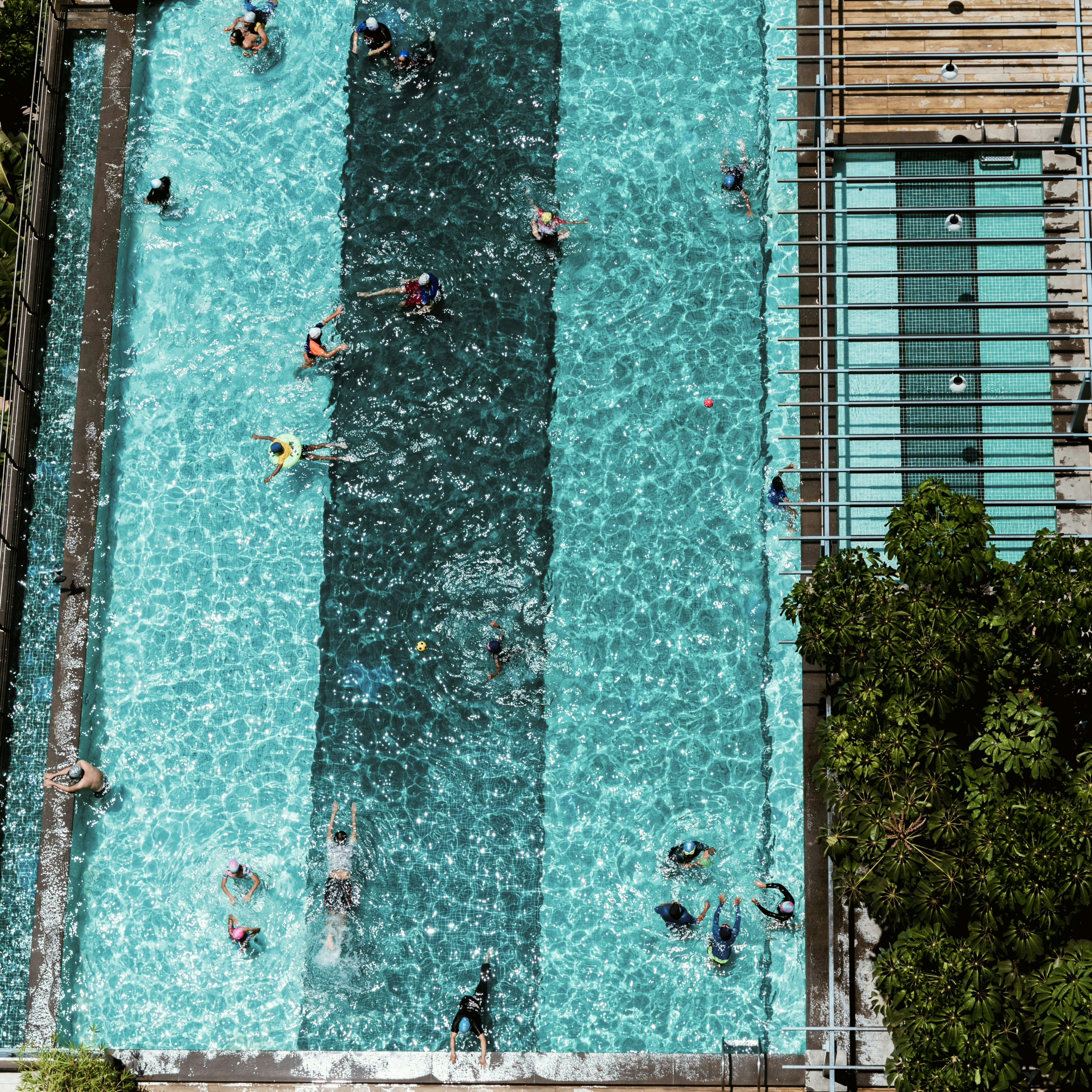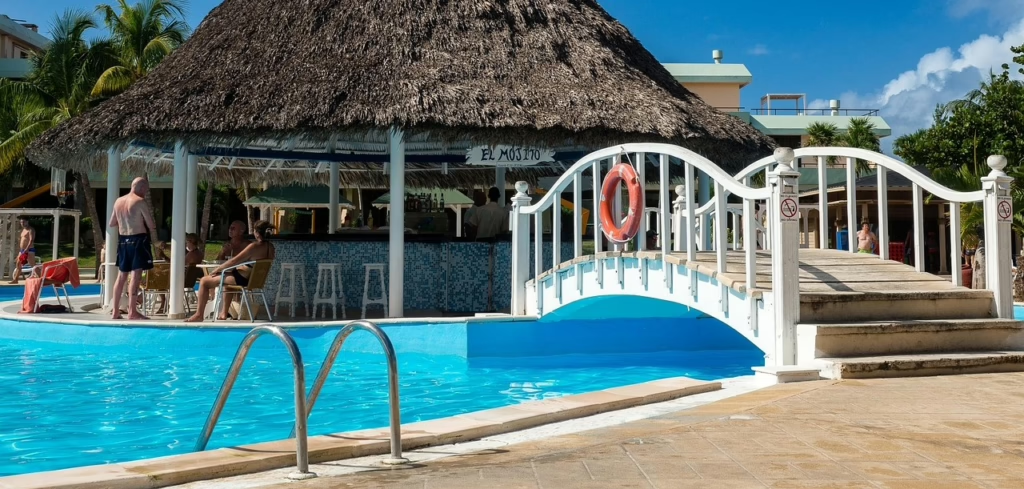There’s nothing quite like the crystal clear water of a pool on a sunny day. Whether you’re spending quality time with family and friends or simply winding down after a long day at work, a clean pool can turn your backyard into a personal oasis. And if you have ever typed “pool cleaning service near me” into a search bar, you know how important (and equally daunting) it is to keep your pool in tip-top condition.
This article is your go-to guide for everything you need to know about pool cleaning. We’ll walk you through the basics of regular maintenance, break down essential pool chemistry, and explore the tools and equipment, to make the job easier. Whether you’re a new pool owner or just looking to improve your personal space, you are in the right place.
The Basics of Pool Cleaning
The key to keeping your pool as your personal sanctuary is consistency. Regular maintenance helps you keep your pool looking its best and save yourself time, money, and stress in the long run. Let’s dive into what you should be do regularly to keep your pool swim-ready.
Daily Maintenance
1. Check the Water Level
Whether it rains or shines, it’s important to ensure your water level remains about halfway up the skimmer. If the water is too high, your skimmer may be unable to skim the surface properly whereas low water levels may cause your pump to suck in air.
2. Run the Pump and Check the Filter
The pump is essential for keeping the water circulating and helping the filter do its job. Ideally, it should be running for 8-12 hours daily. Additionally, it’s important to make sure that the filter pressure gauge is reading at normal pressure. If not, it may be time to clean the filter.
3. Skim for Debris and Empty the Baskets
Take a few minutes to skim the surface of your pool for leaves, bugs, and other floating debris. After skimming, check and empty both the skimmer and the pump baskets to maintain strong circulation and prevent unnecessary strain on your pool equipment.
Weekly Maintenance
1. Test and Balance Chemical Levels
Maintaining the right balance in your pool is key to keeping it clean and safe. Test your pool water weekly for chlorine, pH, alkalinity, and calcium hardness levels. If any of these numbers are off, you can add the right chemicals to balance it.
2. Clean the Pool Deck
We cannot predict where contaminants may be hiding. In fact, they may even be in your pool deck. So, give the area around your pool a quick sweep and/or rinse. This will prevent dirt, leaves, and other debris from making their way into the water, keeping your oasis looking nice and clean.
3. Shock the Pool
Sometimes, regular chlorination is not just enough to keep all pollutants away. Shocking your pool every 1-2 weeks gives it a necessary boost, helping clear out bacteria, oils, and other contaminant buildup that regular cleaning might miss. This is especially helpful after a day of heavy swimming or extremely heavy rains. It is preferable to shock your pool in the evening so that chemicals can work overnight unaffected by the sun.
4. Inspect Pool Equipment
All pool equipment is necessary to keep everything running smoothly, so it’s important to check up on all of these each week. Look over your pump, filter, and even heater to see if there are any signs of wear and tear. You may also check for leaks and strange noises. Catching any issue early can save you time, energy, and money from bigger repairs in the future.
Understanding Pool Chemistry
Knowing the basics of pool chemistry helps you maintain a healthy swimming environment. This is why many pool owners choose to invest in professional cleaning and maintenance services—it takes the guesswork out and helps keep everything running smoothly. Even so, understanding how your pool chemistry works can make managing it easier for you. Here’s a simple guide on key elements to watch.
1. pH Levels
A balanced pH is key to both swimmer comfort and chlorine effectiveness. The ideal range for this is 7.2-7.8. When the pH drops below this range, the water may cause skin irritation and damage to pool surfaces. If it becomes too high, the water may get cloudy and reduce the effectiveness of chlorine at killing bacteria. Thus, easy access to pH increaser and pH decreaser is handy for quick adjustments.
2. Chlorine Levels
To keeping your water safe and free from harmful contaminants, maintain chlorine levels between 1-3 ppm . Anything lower and your pool may be vulnerable to contamination while anything higher may cause irritation to swimmers. If the chlorine levels get too high, it can be diluted with fresh water or a chlorine neutralizer.
3. Alkalinity
Alkalinity helps stabilize your pool’s pH, preventing too much fluctuation from happening. Thus, maintaining it within the range of 80-120 ppm ensures your pH levels also remain balanced and your swimming environment stays comfortable. If alkalinity is too low, pH levels become unstable, you can raise it using an alkalinity increaser. Whereas if alkalinity is too high, a pH decreaser can stabilize these numbers.
4. Calcium Hardness
This measures the “hardness” or “softness” of your pool water and it varies according to your location and water source. If calcium levels become lower or higher than 200-400 ppm, it risks corrosion of pool surfaces and equipment and cloudy water, respectively. Thus, calcium increaser for low levels and water clarifier or flocculant for high levels of calcium can be extremely helpful.
Essential Pool Cleaning Equipment
Maintaining a clean swimming pool calls for a good selection of cleaning tools, reliable water-testing equipment, and efficient filtration systems. Let’s delve into these essentials to ensure your pool remains a healthy and inviting oasis.
Cleaning Tools
Equipping yourself with essential cleaning tools is fundamental to pool upkeep. These tools include items such as pool sanitizers (mainly chlorine), pool shock treatments, skimmers, brushes, manual pool vacuums, and robotic pool cleaners that each serve a unique purpose in ensuring cleanliness within pools. Investing in quality tools, as well as quality cleaning services, tailored specifically for your pool’s needs can significantly enhance the efficiency of your cleaning processes.
Testing Equipment
When swimming, water ingestion and contact are unavoidable. Thus, regular water testing is crucial to maintaining a safe swimming environment. Aside from safety, consistency in checking and adjusting your pool’s chemistry also helps prevent damage to your pool equipment. Using pool water test kits and water balance kits allows you to monitor your pool’s chemical levels and ensure that they remain optimal for swimming.
Filtration System
An effective filtration system is vital for keeping pool water clear, clean, and free from debris. There are three types of pool filters, namely:
1. Sand filters
These filters are inexpensive and long-lasting, only needing to be replaced every 5-7 years. However, they may not be able to capture very fine debris and they can be quite high maintenance as they require weekly backwashing to prevent clogging.
2. Cartridge filters
Being more expensive than sand filters, cartridge filters also have improved filtration abilities and require rinsing only every 2-6 weeks. However, these filters need to be replaced every 3-5 years, therefore sometimes becoming costly for pool owners.
3. Diatomaceous Earth (DE) Filters
The most costly out of the three types of filters, DE filters provide the best filtration abilities available in almost all equipment currently in the market. These require very little maintenance, aside from an annual deep-clean.
Selecting a filtration system that aligns with you and your pool’s specific needs involves checking your budget and willingness to engage in regular maintenance. But ultimately, it is important to remember that an appropriate filtration system is an investment in both your enjoyment and your health.
Seasonal Maintenance Tips
As the seasons change, your pool routine also has to change—this means adjusting your maintenance process according to the seasons. Let’s do a quick dive into things you may need to know year-round.
1. Spring Opening
When it’s time to open your pool, you should remove the cover and clean up the debris on the pool surface. Take the time to look around for any possible damage that happened over the winter, if there are none, fill your pool, clear out possible leftover debris, and get your filter running. Lastly, make sure to test and balance your water’s chemistry.
2. Summer Maintenance
To keep enjoying your pool in the Summer, it’s all about ensuring that your chemicals stay balanced, debris and other contaminants stay out, and your filter stays clean. If you rarely use your pool, you may also consider covering it to prevent evaporation in the heat. And of course, performing daily and weekly maintenance tasks will ensure everything runs smoothly.
3. Fall Winterizing
When it starts to cool down, it’s time to winterize. This will require you to deep clean your pool, check your chemical levels again, lower water levels, and shock your pool. In preparation, you may also want to add algaecide and winterizing treatments, drain and heat up the water pumps, and winterize the plumbing. Lastly, it’s time to cover up your pool to protect it from the winter cold.
Professional Maintenance: When to Call the Experts
Maintaining your personal oasis requires consistent attention to ensure safety and enjoyment. While regular upkeep is manageable independently, certain situations benefit significantly from the expertise of professional pool maintenance services, especially with Cabana Pools. Recognizing these scenarios can help save you and your wallet in the future.
1. Persistent Water Clarity Issues
While cloudy skies may be welcome on a hot day, cloudy pool water is problematic. If your water has not cleared up and you have tried everything—shocking it, running the filter longer, and adjusting chemical levels—it may be time to let a professional take a look.
2. Faulty Equipment
Hearing strange noises from your pump? Finding leaks but you can’t seem to figure out where? Is the filter just not filtering much? This may mean that it’s high time for you to get a professional to check and figure out the problem.
3. Constant Chemical Imbalances
Balancing pH, chlorine, alkalinity, and calcium hardness can be a bit of a straining task. If no matter what you do, the levels are off, you can hire someone to test the water and rebalance the chemistry of your oasis.
4. Seasonal Openings and Closings
Preparation for the summer and the winter requires a series of important steps, including equipment inspection, water level management, and plumbing protection. A professional can help ensure that this process is done in a way that checks all boxes.
5. Limited Time for Regular Upkeep
Life gets busy. And if you simply do not have the time for regular upkeep and the routine of daily and weekly tasks like skimming, testing the water, or cleaning out the filters, hiring a pool cleaning service can save you the time and hassle.
Frequently Asked Questions
1. What should I look for in a pool cleaning service?
Check if your pool cleaning company offers a diverse set of services with clear pricing. Also, make sure that they have positive customer feedback and a strong reputation among their clients.
2. What’s typically included in a standard pool cleaning visit?
Brushing, skimming, and vacuuming the pool surface, cleaning the filter, and testing and balancing the chemicals are usually included in standard pool cleaning services.
3. How much should I expect to pay for professional pool cleaning in San Diego?
While pricing may vary according to pool size and condition, standard service prices typically range from $100 to $200. However, additional repairs and treatments may increase the cost.
4. Can I switch between DIY maintenance and professional service?
Yes! While typical daily maintenance tasks may be easily handled independently, most pool owners still rely on professionals for equipment care and handling.
5. How long should a typical pool cleaning visit take?
Around 45 minutes to an hour. However, this may vary according to pool size and condition.
6. Should I be home when the pool service comes?
Not necessarily. You have the flexibility to come and go as long as the pool technician has access to your pool. For transparency, some companies also provide digital reports so you can access information on what was done to your pool.
7. How do I know if my current pool service is doing a good job?
Clear water, balanced pool chemistry, and well-functioning equipment are good signs to look for. Proper communication from your technician about the work done, including maintenance and repairs, is also important.
8. What should I do if I’m not satisfied with my pool service?
Communicate with your current provider to see if they can resolve any concerns you have. However, persistent issues may require you to consider switching to a company that suits you better.
9.Can pool service help reduce my chemical and energy costs?
Yes, professional pool services are helpful in reducing chemical and energy costs because a well-maintained pool minimizes your need for excessive chemical and energy consumption.
10. How do I know if I need more than just basic service?
If you are running into persistent issues, like consistently discolored or cloudy water, constant equipment malfunctions, it may be time for an upgrade in the services you’re getting. If you don’t think that regular maintenance is cutting it, consider deep cleaning services or equipment upgrades.
Final Thoughts
Maintaining your pool year-round may seem daunting, but staying on top of it makes all the difference. A little attention in the spring, regular care in the summer, and proper preparations for the cold weather can save you stress, money, and time in the long run.
In fact, with our 5-minute setup process, you can have professionals from Cabana Pools help you with pool cleaning and maintenance, and ease you into long-term enjoyment in your oasis.
Want your pool to always be swim-ready? If you’re still looking up “pool cleaning service near me” and struggling to figure out what to do next, take a step towards effortless pool care—and reach out to experts who can help you establish the right routine for a safe and enjoyable swimming environment. After all, balance and consistency are the best way to keep your pool in top shape.




